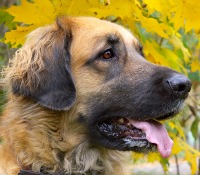Inherited Polyneuropathy in Leonbergers
The AKC Canine Health Foundation is pleased to announce the availability of a new genetic test for Inherited Polyneuropathy in Leonbergers.
 Leonbergers may suffer from a hereditary neurological disease, which has frequently been termed “inherited polyneuropathy (IPN)” or “Leonberger polyneuropathy (LPN)” by veterinarians and breeders. Affected dogs suffer from slowly worsening exercise intolerance and may develop gait abnormalities, such as an exaggerated hitched step, especially in the hind limbs. There is often wasting of the hind limb muscles as well. These dogs may have noisy breathing, a change in their bark, or even difficulty breathing due to involvement of the larynx and laryngeal folds in the throat. Eventually the disease may progress to the point where the dog can no longer support its own weight.
Leonbergers may suffer from a hereditary neurological disease, which has frequently been termed “inherited polyneuropathy (IPN)” or “Leonberger polyneuropathy (LPN)” by veterinarians and breeders. Affected dogs suffer from slowly worsening exercise intolerance and may develop gait abnormalities, such as an exaggerated hitched step, especially in the hind limbs. There is often wasting of the hind limb muscles as well. These dogs may have noisy breathing, a change in their bark, or even difficulty breathing due to involvement of the larynx and laryngeal folds in the throat. Eventually the disease may progress to the point where the dog can no longer support its own weight.
Genetic research funded by the AKC Canine Health Foundation and carried out at the University of Minnesota, the University of Bern, and the University of California San Diego, indicates that polyneuropathy is likely a group of several genetically distinct, but clinically similar diseases. Researchers have mapped two major genetic risk loci and identified the causative mutation in one of these loci that is now termed LPN1. Dogs being homozygous mutant (two copies of the mutation) for this mutation will typically develop neuropathy before they reach 3 years of age. At this time researchers do not know whether dogs that are heterozygous for this mutation (one copy of the mutation) might also develop mild clinical signs later in life, but they will most likely not develop severe disease. The identified mutation is responsible for approximately one third of the cases of polyneuropathy in Leonbergers. The other two thirds of cases are apparently caused by different genetic mutations.
The University of Minnesota and the University of Bern both offer genetic testing for the identified LPN1 mutation. At this time the researchers recommend that all breeding dogs be tested. They also recommend avoiding breeding homozygous mutant dogs as well as matings that could produce homozygous mutant dogs and do not recommend excluding heterozygous mutant dogs from breeding as this would significantly constrict the gene pool of the Leonberger population and might lead to an increase in the other forms of disease. However, dogs heterozygous for the LPN1 mutation should only be mated to tested dogs which are free of the mutation. This will ensure that no homozygous mutant offspring affected with the severe form of the disease will be born.
At this time the implementation of genetic testing cannot completely eliminate polyneuropathy from the Leonberger population. This LPN1 test diagnoses only one of possibly several genetic risk factors. Thus, it is still possible that affected offspring with a different genetic form of polyneuropathy will result even from a mating of two dogs that both have been tested free for this mutation. However, the current LPN1 test can reliably eliminate one severe early-onset form of disease and significantly reduce the overall frequency of neurological disease in Leonbergers.
Dog owners who submitted blood samples for the research projects in either Minnesota or Bern before June 15, 2010, will receive the results of this LPN1 genetic test at no cost within the next few weeks. The investigators are continuing to search for the other genetic risk factors and blood samples from additional dogs affected by apparent neurological disease will enhance this research. Dog owners who submit a blood sample from an affected dog, together with neurological exam or biopsy results, may recieve the LPN1 test for free. In North America, muscle and peripheral nerve biopsy specimens should be submitted to:
Comparative Neuromuscular Laboratory University of California, San Diego Basic Science Building Room 2095 9500 Gilman DriveLa Jolla, CA 92093-0705Phone: (858) 534-1537Website http://vetneuromuscular.ucsd.edu Questions email musclelab@ucsd.edu
Instructions for ordering the LPN1 test:
North America. Genetic testing will be performed at the University of Minnesota Veterinary Diagnostic Laboratory. The preferred sample is 2 – 3 ml of fresh blood collected in EDTA tubes. Further information on sample submission, as well as the required submission forms is available at: http://www.cvm.umn.edu/vdl/ourservices/canineneuromuscular/home.html. The samples, packaged in a padded, leak-proof container, accompanied by a submission form for each dog, should be sent by regular mail, without cooling, to:
Veterinary Diagnostic Laboratory:College of Veterinary Medicine University of Minnesota 1333 Gortner AvenueSt Paul, MN 55108-1098Veterinary Diagnostic Laboratory Phone: (612) 625-8787 or (800) 624-8787Website: www.vdl.umn.eduLPN-specific questions email: lpninfo@umn.edu
The price per test is $85 and the expected turnaround time is 3 – 4 weeks.
Related Articles
Related Genetic Test
Help Future Generations of Dogs
Participate in canine health research by providing samples or by enrolling in a clinical trial. Samples are needed from healthy dogs and dogs affected by specific diseases.



